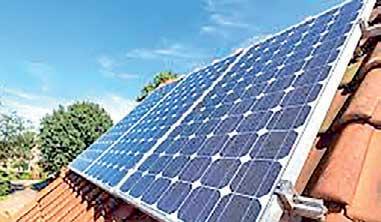23 Aug 2021 - {{hitsCtrl.values.hits}}
By Nishel Fernando
Backed by government support, Sri Lanka solar industry is upbeat over the ability of achieving 2700 MW target in installed capacity by 2030, which in result stands to save as much as US$ 495 million in foreign exchange outflows per annum to the country.
 “We will be saving almost US$ 500 million to the country by the time we hit the 2700 MW target in 2030. In rupee terms, it will be around Rs.150 billion foreign exchange savings to the country through rooftop solar alone,” Solar Industries Association of Sri Lanka (SIASL), General Secretary Lakmal Fernando told its members while addressing the Association’s Annual General Meeting held in Colombo recently.
“We will be saving almost US$ 500 million to the country by the time we hit the 2700 MW target in 2030. In rupee terms, it will be around Rs.150 billion foreign exchange savings to the country through rooftop solar alone,” Solar Industries Association of Sri Lanka (SIASL), General Secretary Lakmal Fernando told its members while addressing the Association’s Annual General Meeting held in Colombo recently.
Sri Lanka’s rooftop solar industry comprising of 260 firms so far has installed 370MW capacity in the country’s rooftops in both residential and commercial establishments.
Fernando was upbeat in achieving this target by 2030 back by the government’s policy and regulatory support.
“Generally, we know that rooftop solar is scalable and easily deployable. A 1-1.5MW of solar rooftop system can be deployable within 2-6 months. This is very achievable. Along with the large rooftops, we can hit this target with less than 400,000 rooftops. This is what we always try to make the regulators and governments understand,” he elaborated.
In a breakthrough to the country’s sustainable energy development initiatives, the State Minister of Solar Power, Wind and Hydro Power Generation Projects Development, Duminda Dissanayake early this month in Parliament announced plans to legalize the government policy to meet 70 percent of the country’s electricity generation through renewable energy sources by 2030.
Accordingly, he expects the Power Ministry to issue a gazette mandating to generate 70 percent of electricity from renewable energy sources by 2030 and consequently, the Ceylon Electricity Board (CEB) would be compelled to come up with a fresh long-term generation expansion plan to meet this proposed renewable energy target.
Dissanayake noted that the Sustainable Energy Authority (SEA), which comes under the purview of his State Ministry, has already submitted a detailed plan to the Ministry of Power as to how to meet 70 percent of the renewable energy generation target by 2030.
Further, he has assured that current renewable energy projects that are under discussion between SEA and CEB have the capacity to meet the country’s electricity demand up to 2025. The tendering process for 100MW Siyambalanduwa Solar Energy Park is expected to commence this year while the tendering processes for 100MW Pooneryn (Phase 1) and Mannar (Phase 2) wind energy park projects are scheduled to commence next year.
Further, the proposed 100MW solar energy parks in Hambantota and Thissamaharama are expected to be ready for tendering by 2023 followed by 100MW Pooneryn (Phase 2) in 2024 and 50MW solar energy park in Northern Province the same year.
However, the Ceylon Electricity Board Engineers’ Union (CEBEU) claimed that the government’s aggressive target to generate 70 percent of the electricity required through renewable energy by 2030 is not feasible, while pointing out that the country needs US$ 3-4 billion investment in upgrading the country’s existing electricity transmission and storage infrastructure over the coming years.
Instead, CEBEU submitted an alternative plan to long-term generation expansion plan, which targets to meet 70 percent electricity generation from ‘clean energy’ sources, including 20 percent LNG sources by 2030.
Meanwhile, Dissanayake who was the chief guest at SIASL’s AGM reassured the required support of the government for the country’s solar industry to meet the renewable energy targets, while outlining that the solar industry has become a key priority industry of the top ranks of the government including President Gotabaya Rajapaksa.
Meanwhile, Fernando expressed concerns over the composition of the tariff committee appointed by the Secretary to the Ministry of Power for all non-conventional renewable’s energy sectors.
The Committee was appointed based on instructions of State Minister Dissanayake, however, Fernando pointed out that the Secretary to the Ministry of Power appointed a ‘biased committee’ without industry, public or PUCSL representatives.
18 Nov 2024 15 minute ago
18 Nov 2024 50 minute ago
18 Nov 2024 51 minute ago
18 Nov 2024 1 hours ago
18 Nov 2024 1 hours ago